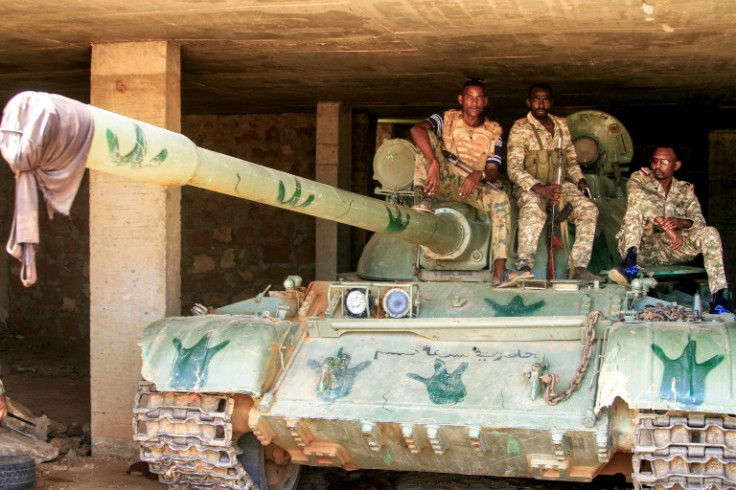Sudan Army Strike Kills At Least 12 In Darfur: Monitors

A war monitoring group said Sunday that an army drone strike on a clinic in the city of Nyala, western Sudan, under paramilitary control, had killed at least 12 people.
Their report came after a medical source said Sunday that shelling by the paramilitary Rapid Support Forces (RSF) force had killed at least seven people and wounded 71 others in the besieged city of El-Fasher.
The army strike hit the Yashfeen clinic in Nyala, the capital of South Darfur, at around midday Saturday, a source from the Emergency Lawyers group told AFP.
Speaking on condition of anonymity for safety reasons, the source said they expected the death toll to rise, as preliminary reports had indicated that dozens of civilians and medical staff may have been killed.
There was no immediate comment from the Sudanese army.
The deadly shelling of El-Fasher happened on Saturday, said the medical source. The city is the last major bastion in the vast western Darfur region still under army control.
El-Fasher has become the most violent front line in the war between the Sudanese army and the RSF, which erupted in April 2023.
In recent weeks, paramilitary forces have escalated their long-running siege, launching fierce artillery barrages and ground incursions into densely populated neighbourhoods, the city's airport and the famine-hit Abu Shouk displacement camp.
The few hospitals still operational have been repeatedly bombarded and the local police headquarters captured by the RSF.
The medical source, who requested anonymity for safety reasons, said the true toll from Saturday's attack was "likely higher", as many of the wounded had been unable to reach the hospital due to the intensity of the bombardment.
Of those wounded, mainly by shrapnel, 22 were reported to be in a critical condition, said the source, who was reached via satellite internet to bypass a communications blackout.
Local activists said the attack hit several neighbourhoods in the city's west near the airport, which RSF forces have sought to capture.
The RSF evolved from the Janjaweed Arab militias accused of genocide in Darfur in the early 2000s.
It wants to wrest full control of the region from the army after being pushed out of the capital Khartoum earlier this year.
Satellite imagery from Yale University's Humanitarian Research Lab revealed Thursday that the RSF had constructed more than 31 kilometres of berms -- raised earth barriers -- "creating a literal kill box" in the city, the report said.
Its imagery also identified munitions impact damage at the city's water authority, which supplies El-Fasher with fresh drinking water.
Nathaniel Raymond, the lab's executive director, said the RSF had confined the Sudanese army and its allied militias to less than five square miles (12.9 kilometres) in the city.
"It's the smallest it's been since the siege began," he told AFP.
The besieged population -- estimated by the UN at some 300,000 -- has endured severe shortages of water and food for over a year, according to humanitarian workers.
Famine was officially declared in three displacement camps around El-Fasher last year, and the UN warned it could spread to the city itself by last May.
Lack of data has so far prevented an official declaration of famine, but the UN estimates that nearly 40 percent of children under five are acutely malnourished, with 11 percent severely so.
Many have resorted to eating animal fodder, while desperate attempts to escape into the desert often end in death from exposure, starvation or violence.
"They are dying in poverty, crossfire and bombardment and they're being killed as they're trying to leave," he added.
The RSF, which recently announced the formation of a parallel government in the region, would control all five Darfur state capitals if it were to successfully capture El-Fasher.
Experts have warned that the city's non-Arab Zaghawa tribe may face a similar fate to the non-Arab Massalit tribe in West Darfur's state capital of El-Geneina. UN experts found up to 15,000 people, mostly from the tribe, were killed in 2023 massacres blamed on RSF forces.
Both sides have been accused of war crimes, but the RSF has, in particular, been accused of genocide, sexual violence and systematic looting.
In the early 2000s, the paramilitary force led a government-orchestrated campaign of ethnic cleansing against non-Arab ethnic groups in Darfur, killing an estimated 300,000 people.
"The Janjaweed are about to win the entire genocide that began in the early 21st century," Raymond said.
"And the world isn't going to do anything about it."
© Copyright AFP {{Year}}. All rights reserved.





















